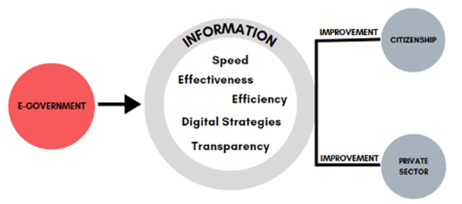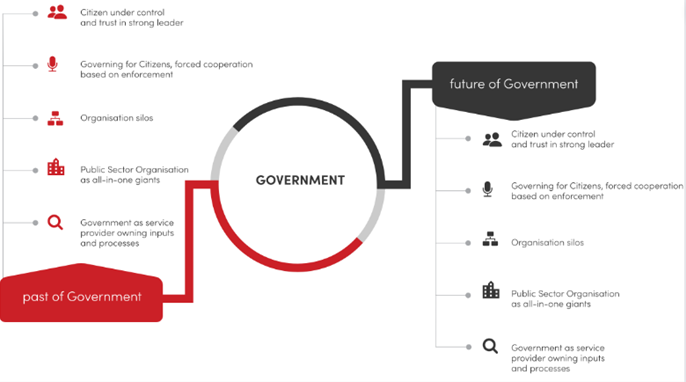The incorporation of technology in the public sector

The incorporation of technology in the public sector refers to the process of introducing and utilizing various technologies in the operations and services provided by governmental entities. This can encompass a wide range of initiatives, from implementing computer systems and specialized software to using online platforms to enhance the efficiency and accessibility of public services.
Some examples of the incorporation of technology in the public sector include
- Digitization of administrative processes
- Development of electronic platforms for the delivery of government services
- Use of data analytics for informed decision-making
- Application of emerging technologies such as artificial intelligence and blockchain to improve transparency and security in government operations.
Benefits provided by technology:
Technology offers a series of benefits to the public sector, improving efficiency, transparency, and the quality of government services. Some key benefits include:
- Operational Efficiency: The implementation of technologies allows for process automation, reducing response times and optimizing resource management. This leads to a more efficient administration of public services.
- Transparency: Information technologies facilitate government transparency by providing public access to relevant information. Online platforms, open data portals, and tracking systems allow citizens to obtain information about government actions and decisions.
- Citizen Engagement: Technological tools, such as social media and online participation platforms, provide citizens with the opportunity to actively participate in decision-making and express their opinions on government policies and programs.
- Improvement in Service Delivery: Technology facilitates the efficient delivery of public services, such as healthcare, education, and justice administration. Electronic systems can streamline access to these services, improving quality and accessibility.
- Security and Data Protection: Technology plays a crucial role in data security and protection. Advanced computer systems help safeguard sensitive information, ensuring the privacy and integrity of government and citizen data.
- Cost Reduction: Process automation and technology implementation can lead to long-term operational cost reduction. This frees up resources that can be allocated to other critical areas.
- Crisis Management and Rapid Response: Communication technologies enable more effective management during crises and emergencies. The rapid dissemination of information through electronic channels can be vital for coordinating responses and providing efficient assistance.
- Economic Development: Investment in technology in the public sector can drive economic development by facilitating job creation in the technology sector and encouraging innovation.

The future of the public sector:
The future of the public sector with technology promises significant transformations in the way government services are managed and delivered. Here are some trends and potential developments that we could expect to see:
- Artificial Intelligence (AI) and Automation: The implementation of AI and automation will continue to increase in the public sector. Chatbots, automated decision-making processes, and virtual assistants could further optimize operational efficiency and improve interaction with citizens.
- Open Data and Transparency: There is an expected increased focus on opening government data. Governments could adopt more robust open data policies, providing citizens access to valuable information and fostering innovation and citizen engagement.
- Blockchain for Security: Blockchain technology could be used to enhance the security and integrity of government data. This decentralized technology can help prevent fraud and ensure the authenticity of crucial records.
- E-Government: The complete digitization of government processes could become a reality. Online government services could become even more comprehensive, allowing citizens to conduct transactions and access services from anywhere with an internet connection.
- Enhanced Cybersecurity: With the increase in digitization, cybersecurity will become an even greater priority. Governments will need to strengthen their security measures to protect confidential data and ensure the integrity of their systems.
- Digital Citizen Engagement: Citizen engagement will be facilitated through online platforms and specific applications. Citizens could have more direct involvement in decision-making through surveys, online forums, and other digital engagement tools.
- Focus on Sustainability: Governments could adopt sustainable technologies to reduce their environmental footprint. Solutions such as smart resource management, renewable energy, and sustainable urban planning could be priorities.
- Intersectoral Collaboration: Technology will facilitate greater collaboration between different government sectors. Integrated platforms and interoperable systems will allow better coordination among various government entities, improving efficiency and decision-making.

In conclusion, the integration of technology in the public sector represents a fundamental shift that offers a range of significant benefits. As we move towards the future, technology will continue to play a crucial role in transforming the public sector. Technology not only enhances the internal management of governments but also strengthens the relationship between the government and citizens, fostering a more participatory and results-oriented environment. This progressive approach to digitization and technological innovation opens the door to a more agile, adaptable, and capable public sector that can effectively address emerging challenges.

